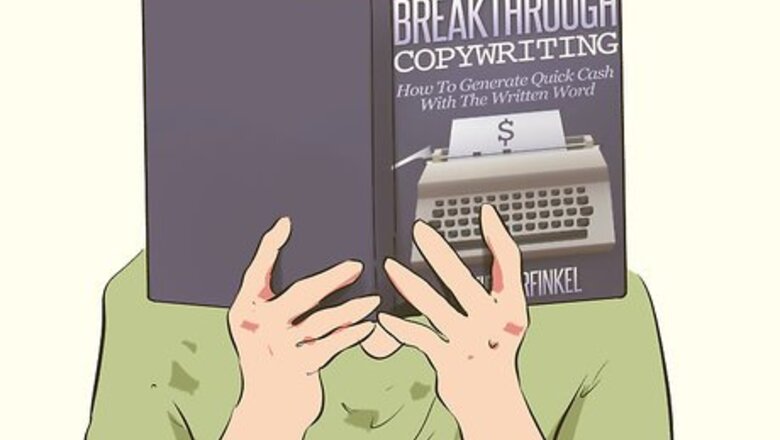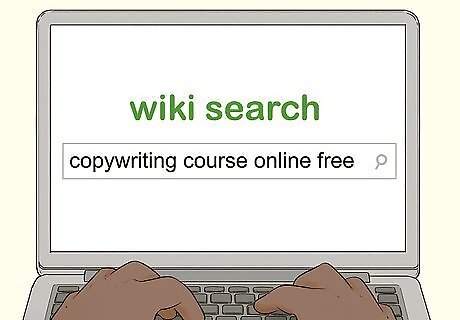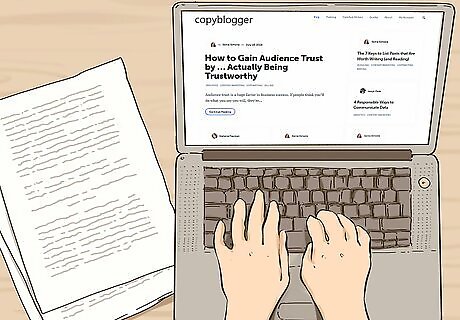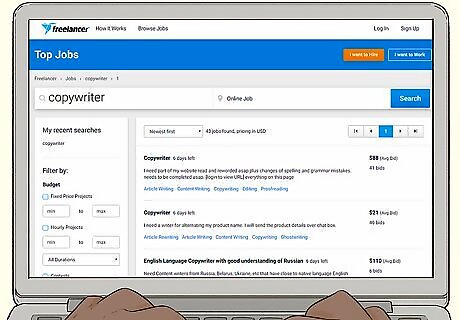
views
- Get tips from professionals by taking a copywriting course or reading books and blogs written by professionals.
- Get in the habit of noticing copy you come across throughout the day, and pay attention to what makes it either good or bad.
- Hone your skills by spending 10-30 minutes a day writing or editing copy and headlines.
- The best copy is short and snappy—and don't forget to include a call to action!
Studying the Craft

Read copywriting books thoroughly. There are endless books to choose from when it comes to the topic of copywriting. Look for books written by professional copywriters, or books that got excellent reviews and contain the material you’d like to learn. Try to read the books thoroughly to really grasp the content. Take notes while you’re reading so you remember key information, if desired. Great copywriting books include The Copywriter's Handbook by Robert W. Bly, Breakthrough Copywriting by David Garfinkel, and The Idea Writers by Teressa Iezzi.

Consider investing in a copywriting course. There are tons of online copywriting courses you can do from the comfort of your own home, and lots of them are even free of cost. If you’d rather learn copywriting in an actual classroom or community space, ask your local libraries, colleges, or community centers if they have copywriting courses you could take. Type “online copywriting courses” into a search engine to peruse many online class options. You can also do an online search for local in-person copywriting classes by typing “copywriting workshops near me” or something similar into the search engine.

Visit blogs that talk about people’s experiences copywriting. Many successful copywriters create their own blogs, posting articles on copywriting tips and tricks, how to gain clients or testimonials, as well as many other topics. Look online for blogs on copywriting to hear more personalized advice from experts. Popular copywriting blogs include Copyblogger and ABC Copywriting.

Look at examples of copywriting everywhere you go. Examples of copywriting are all around you—at the grocery store, on billboards, in your emails, and in commercials. Try to pay closer attention to any ads you see throughout the day, thinking about whether or not they make you want to buy the product and why. For example, read an email from a store selling clothing, jewelry, art, or other sort of product. Notice the tactics they use for trying to get the reader’s attention. Look at an ad you got in the mail to analyze what makes it stand out as good or bad copy. If there’s something you saw recently in an ad and are excited to buy, think about the reason why you’re excited to buy it and if it has anything to do with the copywriting.

Learn about fields related to copywriting for job ideas. A great copywriter isn’t just good at grammar and spelling, they need knowledge of the other areas in which copywriting is prevalent. Try to learn tips about sales and marketing, storytelling, and consumer psychology by reading books and online articles on each topic. While you don't need to be an expert on these subjects, having general knowledge of them will help you as a copywriter. For example, if you're hoping to write ads, knowing a little about marketing and how to get a consumer's attention will help your writing. Consider taking a free online or in-person course on one of the topics as well.
Practicing Your Skills

Write pieces of copy every day. Even if you read all there is to know about copywriting, the best way to become great at it is to practice. Try to set aside time to write pieces of copy daily, even for just a few minutes. Use the tips you read about, and with lots of practice, you’ll get better each day. If there’s a specific kind of copywriting you want to do, such as video scripts or social media, try to practice doing these types of copy. Set a timer for 10-30 minutes and focus on writing copy for the entire time.

Answer the important questions in your writing. When you’re writing a piece of copy, your client or boss will likely want key information answered. This includes questions like “How would you describe the product?” or “What’s unique about it?” Use these questions to help provide the content for your writing. Other questions to consider answering are “What benefits does the product provide?” and “What features are included?” Think about what you would want to know about the product if you were the consumer.

Try to turn existing pieces of copy into something better. This is a fun way to test out your creativity and copywriting skills. Find a copywriting example written by someone else, reading it over several times before trying to rewrite it yourself to make it better. Focus on grabbing the reader’s attention while keeping the writing condensed. For example, buy a bag of chips and read the copy on the back of the bag. Now try to rewrite the copy, using the important facts while making the writing your own. Enhance the copy you find in your email inbox, trying to condense it into an attention-grabbing couple of sentences.

Focus on headlines that capture people’s attention. The first couple of sentences are the most important when you’re writing copy. Your goal is to hold the reader’s attention and make them want to keep reading. Practice writing interesting headlines, making them funny, statistical, or inspiring. Some copywriting jobs will involve coming up with just a sentence that's supposed to capture the consumer's interest, such as slogans. Copy that engages the reader is often full of verbs and simple speech that is almost conversational.

Encourage people to take action in your writing. Copywriting is all about persuading someone to do something, such as purchase the product you’re writing about. Try to summarize the important details of the subject of your writing in an interesting and informative way, making your copy a call to action. Your goal is to convince people that what you’re writing about is great and deserving of their attention. You can do this by writing in actionable terms and giving your writing a sense of urgency.

Keep it short and to the point. Not many people want to read long articles about something they’re not sure they care about yet, such as an email from a shoe company or a blog encouraging people to volunteer. Keep your writing short and sweet, giving the audience needed details in a condensed fashion. There are examples of concise, well-written copy all around you, such as in magazines, on billboards, and on email signups. Practice writing copy of all different lengths, such as a short paragraph, a couple sentences, or even just a few words.
Finding a Gig

Create a portfolio of work to share with potential clients or bosses. While degrees and recommendations are super helpful, your portfolio is the best example of your talents as a copywriter. To put a portfolio together, gather as many examples of your copywriting as possible. Pick out your best pieces, and these will be the ones you’ll show to possible clients or during job interviews to showcase your skills. Ask friends or family members if they need help with an email, website, or slogan so you can use this in your portfolio. If you can’t find any possible clients to create copy for, create a made-up project for yourself to craft copy.

Look online on copywriting websites. There are lots of websites geared towards freelance copywriters looking for work. On these sites, you can apply to tons of different copywriting jobs from people who are looking for a copywriter that suits their needs. Check out sites like Upwork or Flexjobs to find copywriting jobs you might like. Freelancer.com, iWriter, Guru, and SimplyHired are all great sites to find potential copywriting jobs. The pay for each job on these sites will differ, but usually you start off being paid a small amount as a beginner and slowly gain more money with experience.

Answer people’s questions on social media or message boards. If you come across someone on sites like Facebook, Craigslist, or other message boards asking questions related to copywriting, try to answer them. If you give good advice, they’re more likely to follow up and ask you to write copy for them. If you’re talking to someone in person who asks a question about marketing or copywriting, try to answer it—you never know if they might end up hiring you to help them.

Gather testimonials to help brand yourself as a copywriter. Whenever you finish a project for someone, ask them if they’ll write you a testimonial or review. Collecting testimonials from past clients, whether you worked for them in-person or online, will help you gather more clients in the future. Potential clients can read your testimonials and feel more confident that you’ll do a great job for them.

Do research about the brand before applying to jobs. If you find a copywriting job you want to apply for, avoid just talking in vague terms about your copywriting experience. Look up and see what it is you might be writing about for them—this will not only help you create a more detailed cover letter, but it will help you in an interview to show that you’re truly interested in the job. A potential client or boss wants their copywriter to really know the product or idea that they’re selling, which is why it’s important to do some preliminary research beforehand.

Consider moving to a large city full of copywriting job opportunities. If you don’t want to work remotely, it can be more difficult to find copywriting jobs, especially if you live in a small town or city. If you’re serious about copywriting, think about moving to a bigger city like New York, San Francisco, or Chicago where there are lots more job opportunities for copywriters. Go online to job search websites to find potential copywriting jobs in lots of different cities.



















Comments
0 comment